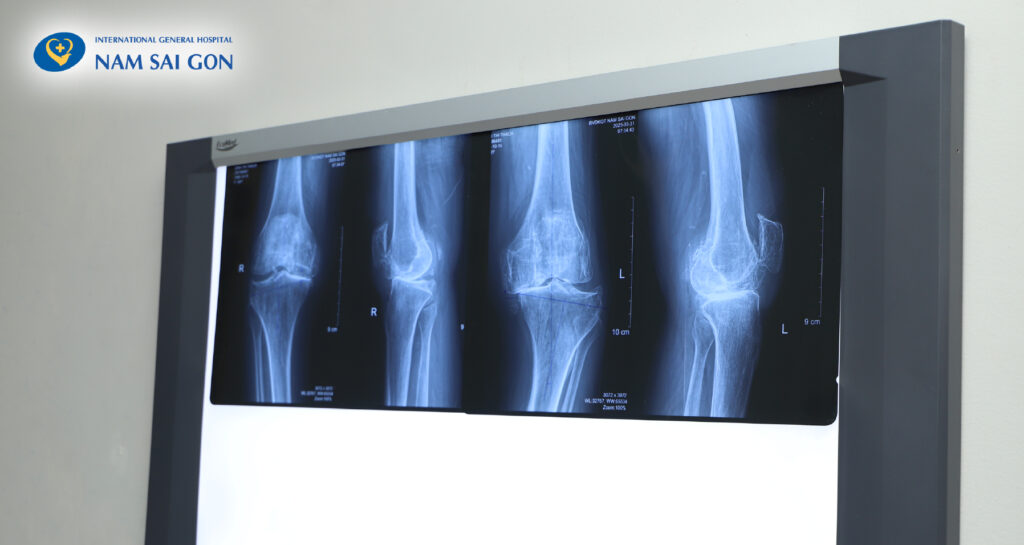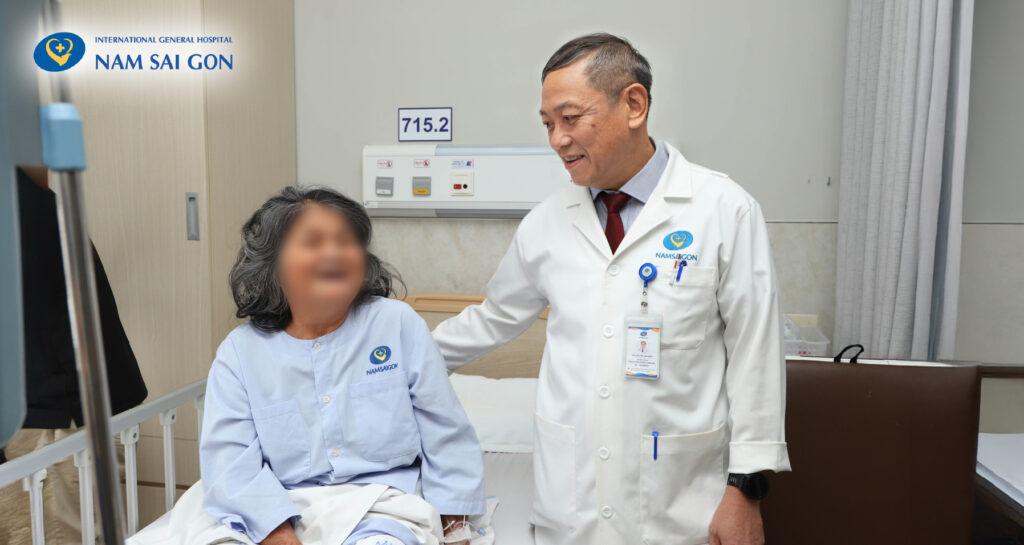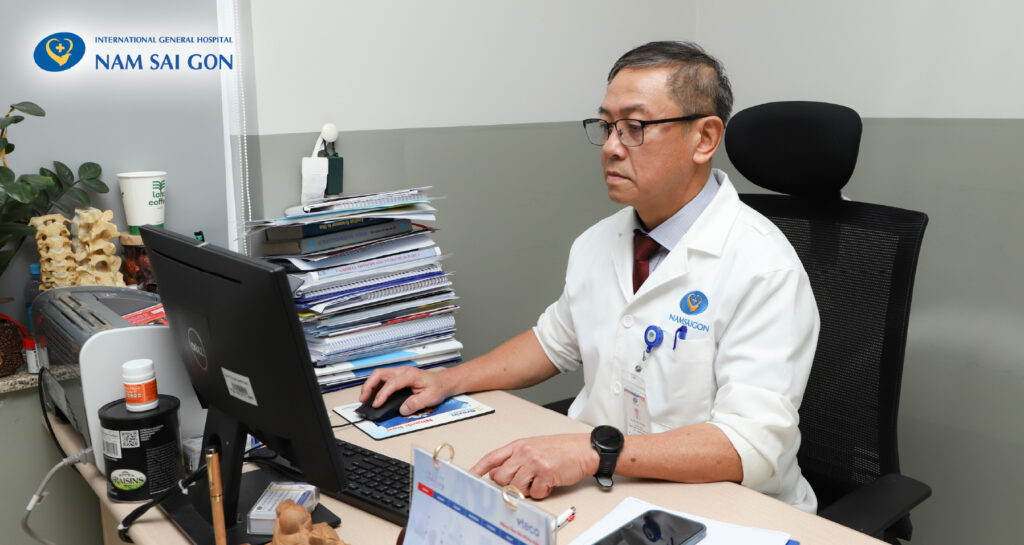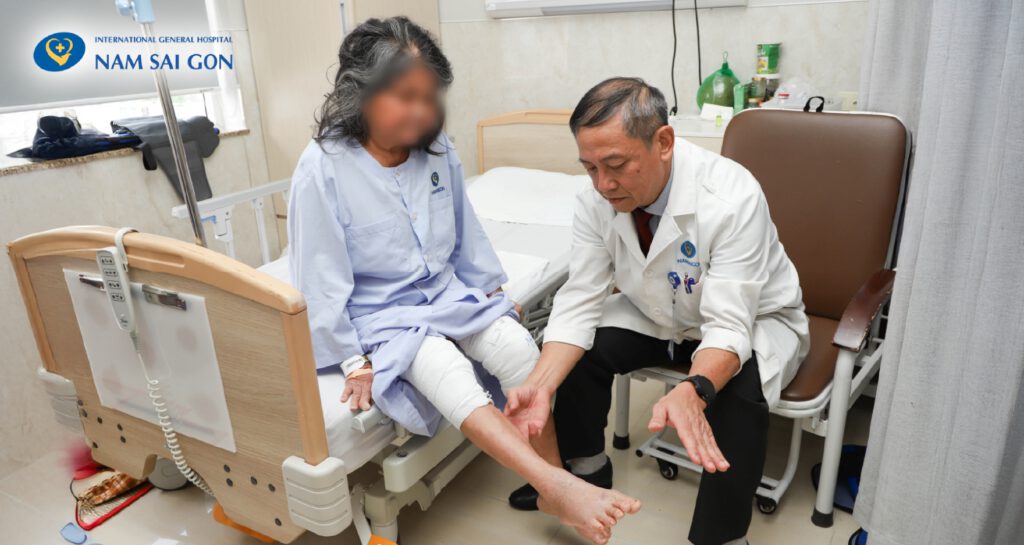KNEE DEFORMITY CAUSED BY CORTICOSTEROID USE
-
Author: BỆNH VIỆN ĐA KHOA QUỐC TẾ NAM SÀI GÒN
-
31/05/2025
-
261
“I thought I would never be able to stand up again…” — Mrs. Đ.T.T. (69 years old, Lam Dong) recalled tearfully the decade she spent in pain, deformity, and dependency on a wheelchair — the result of long-term self-medication with painkillers. Just when she thought she’d spend the rest of her life in that chair, she found hope at Nam Sai Gon International General Hospital — through the care and commitment of devoted doctors.
When Knee Pain Gradually Took Away Her Mobility
It all began over a decade ago, when Mrs. T. started experiencing dull aches in her knees after walking for long periods. At first, she thought it was just part of aging. However, the pain gradually worsened — especially on cold days or during weather changes. A medical check-up revealed that she had knee osteoarthritis.
Later, a neighbor recommended an oral medication that “quickly relieves pain and saves the hassle of going to the hospital”. Trusting the advice, Mrs. T. began taking the pills. Initially, they seemed effective — the pain subsided, and she resumed her usual routines. But what followed was the beginning of a long, dark chapter…

The High Price of Long-Term Self-Medication
The so-called “miracle” drug contained corticosteroids — substances known for their powerful anti-inflammatory and pain-relieving properties. However, improper and prolonged use without a doctor’s supervision can result in severe complications such as osteoporosis, adrenal insufficiency, high blood pressure, diabetes, and more.
“At first, I only took it when I was in pain. But later, every time I stopped, the pain became unbearable. So I started taking it every day — sometimes even increasing the dosage myself”, Mrs. T. recalled.

After about five years of continuous use, Mrs. T. began to notice alarming changes. Her face grew rounder, her waist expanded while her legs shrank and her knees turned inward. Skin wounds healed slowly. Her blood pressure surged, and her blood sugar became unstable. Most troubling of all, her legs grew too weak to support her body. Walking became difficult, then impossible. Eventually, she relied on a wheelchair for everything — eating, bathing, and even personal hygiene — completely dependent on her family.
“One morning, I woke up and my legs just wouldn’t move. But I still forced myself to get up and go to work. Later, when I couldn’t walk at all, my family bought me a wheelchair. From then on, I needed help with everything… I never wanted to be a burden to my loved ones”, she said, emotion flickering across her face.
A Ray of Hope After Years of Darkness
Determined not to burden her children and grandchildren, Mrs. T. sought care at Nam Sai Gon International General Hospital. There, Dr. Vo Van Man, Specialist Level II, Head of the Orthopedics & Traumatology Department, personally examined her and diagnosed bilateral grade 4 knee osteoarthritis — the most severe stage — along with Cushing’s syndrome, osteoporosis, diabetes, and high blood pressure due to prolonged corticosteroid use.
“This was a challenging case”, said Dr. Man. “Besides joint replacement surgery, we needed to work with internal medicine specialists to stabilize her underlying conditions. Without a comprehensive treatment approach, the risks for an elderly patient like her would have been very high”.
Comprehensive Treatment Plan: Two-Stage Knee Replacement
Following a multidisciplinary consultation, the team devised a two-stage surgical plan — allowing her body time to adapt, reduced strain on the heart and other organs, and improved overall recovery outcomes.
- First, they replaced the left knee, which was more deformed and painful.
- Two weeks later, once her health had improved, they replaced the right knee.
Both surgeries were carried out safely and successfully. Mrs. T. began physical therapy shortly afterward.

Step-by-Step Recovery — Regaining an Independent Life
From initially being able to only move slightly, Mrs. T. gradually stood up, then began walking with a frame. Her first steps in over 10 years brought tears to her family’s eyes.
“At first, my family was very worried. But after meeting Dr. Man and the hospital team, I felt confident enough to undergo the surgery”, Mrs. T. shared emotionally.

A Lesson for Joint Patients: Don’t Self-Medicate
“I want to share my story so that others suffering from joint pain won’t make the same mistake. Don’t listen to word-of-mouth advice. Don’t self-medicate. See a doctor. These ten years have been a painful lesson, and I hope no one else has to go through what I did”, Mrs. T. said.
Dr. Vo Van Man, Specialist Level II emphasized: “Corticosteroids are powerful and fast-acting drugs used in the treatment of many conditions. However, long-term use without medical supervision can lead to serious complications such as Cushing’s syndrome, osteoporosis, high blood pressure, diabetes, and adrenal insufficiency”.
For osteoarthritis, corticosteroids should only be used in specific cases under strict medical supervision.
“Patients must understand — there is no “miracle drug” that completely cures osteoarthritis. In mild cases, lifestyle changes can help. But in advanced stages, joint replacement is the most effective treatment to help patients regain mobility”, Dr. Man explained.
See a Doctor Before You End Up in a Wheelchair!
If you or a loved one are experiencing signs such as persistent knee pain, pain during movement, morning stiffness, joint cracking sounds, swelling around the knee, or difficulty standing up and sitting down — these could be signs of knee osteoarthritis.
Don’t ignore the symptoms or rely on over-the-counter painkillers. Visit a reputable medical facility with an orthopedics department for proper diagnosis and timely treatment — before the condition worsens and severely affects your mobility.
Nam Sai Gon International General Hospital accepts both public health insurance and private health insurance.
Nam Sai Gon International General Hospital
No. 88, Street No. 8, Trung Son Residential Area, Binh Hung Commune, Ho Chi Minh City.
Hotline: 18006767
info@nih.com.vn
Last updated: 13:57 18/11/2025






